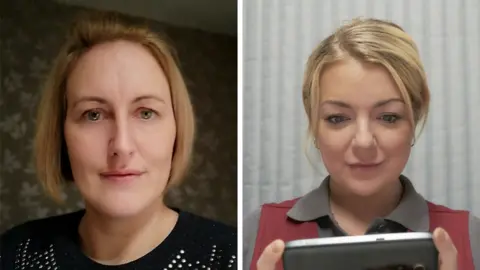Online gambling: Labour promises tougher limits
 Getty Images
Getty ImagesLimits on how much internet gamblers can stake and spend online would be introduced if Labour was in power, the shadow culture secretary has promised.
Tom Watson said the tougher rules would tackle "Britain's hidden epidemic" and said current laws were "unfit for the digital age".
Labour's plans would also include a limit on the speed of play.
The government said it constantly reviews regulations and does "not hesitate to act when needed".
In his speech at the Institute for Public Policy Research in London on Thursday, Labour's deputy leader will refer to the case of a young gambling addict with a brain injury who lost £210,000 in online betting.
According to the Gambling Commission, which regulates the industry, Britain has the largest regulated online gambling market in the world, generating £4.7bn for companies per year - and is expected to grow.
The commission said there were no restrictions in online stakes, prizes or the speed of play.
 Reuters
ReutersAhead of his speech, Mr Watson said problem gambling should be treated "as a public health emergency".
"Whereas gambling in the offline world is highly regulated, the lack of controls on online gambling is leading to vulnerable consumers suffering huge losses," he said.
Online companies, he said, "have a responsibility to protect their customers from placing bets that they cannot afford. But too often, these operators have either neglected the care of their customers or have been too slow in their due diligence.
"We need to see a culture of limits introduced to internet gambling: a system of thresholds placed on the spend, stake and speed... that will give safeguards to consumers."
Under the plans, Labour would create a new category in the current legislation - which is the 2005 Gambling Act - specifically for online betting.

'Like playing computer games'
Mr Watson's speech follows a number of moving accounts from people who have struggled with gambling addiction.
Last month, a woman who built up debts of £70,000 by gambling online said it was easier to lose money on the internet than in a casino because "it just seems like digits".
"You're in this online virtual reality so you're not dealing with what you're dealing with in reality," says Kelly Field, who shared her story with the makers of ITV's Cleaning Up.
The TV programme followed the story of an office cleaner, played by Sheridan Smith, who turns to crime to cover her gambling debts.
 ITV
ITVMs Field said online gambling "feels like playing computer games when you're a kid".
"You've got your high scores, your lives left. It just seems like digits, it's not really money. That's why people lose so much."
She said she hid her addiction at first, choosing to "smile and hide the credit card bill".
But the pressure of the financial losses and lies took its toll on her.
"You isolate yourself so much for everybody. You get trapped in a cycle of playing to win, losing, then playing to win back whatever you've lost, and then losing more. You miss appointments, social events," she said.
"It takes a part of you that you never get back. You are physically and mentally not the person that you were before."

Mr Watson said he was launching a consultation to gather information about the relationship between gambling and online video games.
Loot boxes - which contain virtual items which can be bought by players with cash - will be among the subjects covered in the review.
A spokesman for the Remote Gambling Association said: "We fully embrace the need to move faster to tackle problem gambling through effective regulation based on innovation, evidence and customer data and we are committed to working with the government and opposition to achieve that goal."
Limits on players' spending were proposed in a review by the Gambling Commission in March last year.
The commission said it would consult on the limits, which in theory would only be increased once further checks - for example on whether the player could afford it - were carried out.
The review said that although online firms have a lot of data on players which they could use to identify problem gamblers, progress by the online industry "has been significantly slower than we expected and required".
'Robust requirements'
Earlier this month, the commission announced it was bringing in new rules which mean online gambling firms must verify a customer's age before the customer can withdraw winnings.
A spokesman for the Department for Digital, Culture, Media and Sport said it was "paramount" that vulnerable people are protected from harm.
"There are robust requirements to safeguard players across every form of gambling and to prevent money-laundering. All operators must adhere to these rules if they wish to operate in the British market.
"We constantly keep regulations under review and do not hesitate to act when needed. The Gambling Commission has a range of powers, for offline and online gambling, and we expect it to take the strongest possible action against any company that breaks the rules."
